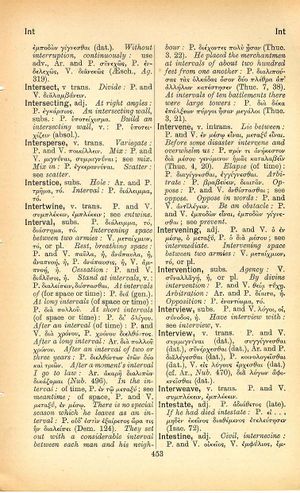interval: Difference between revisions
Πολλοὺς ὁ πόλεμος δι' ὀλίγους ἀπώλεσεν → Bellum paucorum gratia aufert plurimos → Der Krieg vernichtet viele wegen weniger
(Woodhouse 3) |
(CSV4) |
||
| Line 1: | Line 1: | ||
{{ | {{Woodhouse1 | ||
| | |Text=[[File:woodhouse_453.jpg|thumb|link={{filepath:woodhouse_453.jpg}}]]'''subs.''' | ||
P. [[διάλειμμα]], τό, [[διάστημα]], τό. | |||
<b class="b2">Intervening space between two armies</b>: V. μεταίχμιον, τό, or pl. | |||
<b class="b2">Rest, breathing space</b>: P. and V. [[παῦλα]], ἡ, [[ἀνάπαυλα]], ἡ, [[ἀναπνοή]], ἡ, P. [[ἀνάπαυσις]], ἡ, V. ἀμπνοή, ἡ. | |||
<b class="b2">Cessation</b>: P. and V. [[διάλυσις]], ἡ. | |||
<b class="b2">Stand at intervals</b>, v.: P. διαλείπειν, διίστασθαι. | |||
<b class="b2">At intervals of</b> (for space or time): P. διά (gen.). | |||
<b class="b2">At long intervals</b> (of space or time): P. διὰ πολλοῦ. | |||
<b class="b2">At short intervals</b> (of space or time): P. διʼ ὀλίγου. | |||
<b class="b2">After an interval</b> (of time): P. and V. διὰ χρόνου, P. χρόνου διελθόντος. | |||
<b class="b2">After a long interval</b>: Ar. διὰ πολλοῦ χρόνου. | |||
<b class="b2">After an interval of two or three years</b>: P. διελθόντων ἐτῶν δύο καὶ τριῶν. | |||
<b class="b2">After a moment's interval I go to law</b>: Ar. ἀκαρῆ διαλιπὼν δικάζομαι (<b class="b2">Nub.</b> 496). | |||
<b class="b2">In the interval</b>: of time, P. ἐν τῷ [[μεταξύ]]; see [[meantime]]; of space, P. and V. [[μεταξύ]], ἐν μέσῳ. | |||
<b class="b2">There is no special season which he leaves as an interval</b>: P. οὐδʼ ἐστὶν ἐξαίρετος ὥρα τις <b class="b2">ἣ</b>ν διαλείπει (Dem. 124). | |||
<b class="b2">They set out with a considerable interval between each man and his neighbour</b>: P. διέχοντες πολὺ ᾖσαν (Thuc. 3. 22). | |||
<b class="b2">He placed the merchantmen at intervals of about two hundred feet from one another</b>: P. διαλιπούσας τὰς ὁλκάδας ὅσον δύο πλέθρα ἀπʼ [[ἀλλήλων]] κατέστησεν (Thuc. 7, 38). | |||
<b class="b2">At intervals of ten battlements there were large towers</b>: P. διὰ [[δέκα]] ἐπάλξεων πύργοι ἦσαν μεγάλοι (Thuc. 3, 21). | |||
}} | }} | ||
Revision as of 09:45, 21 July 2017
English > Greek (Woodhouse)
subs.
P. διάλειμμα, τό, διάστημα, τό. Intervening space between two armies: V. μεταίχμιον, τό, or pl. Rest, breathing space: P. and V. παῦλα, ἡ, ἀνάπαυλα, ἡ, ἀναπνοή, ἡ, P. ἀνάπαυσις, ἡ, V. ἀμπνοή, ἡ. Cessation: P. and V. διάλυσις, ἡ. Stand at intervals, v.: P. διαλείπειν, διίστασθαι. At intervals of (for space or time): P. διά (gen.). At long intervals (of space or time): P. διὰ πολλοῦ. At short intervals (of space or time): P. διʼ ὀλίγου. After an interval (of time): P. and V. διὰ χρόνου, P. χρόνου διελθόντος. After a long interval: Ar. διὰ πολλοῦ χρόνου. After an interval of two or three years: P. διελθόντων ἐτῶν δύο καὶ τριῶν. After a moment's interval I go to law: Ar. ἀκαρῆ διαλιπὼν δικάζομαι (Nub. 496). In the interval: of time, P. ἐν τῷ μεταξύ; see meantime; of space, P. and V. μεταξύ, ἐν μέσῳ. There is no special season which he leaves as an interval: P. οὐδʼ ἐστὶν ἐξαίρετος ὥρα τις ἣν διαλείπει (Dem. 124). They set out with a considerable interval between each man and his neighbour: P. διέχοντες πολὺ ᾖσαν (Thuc. 3. 22). He placed the merchantmen at intervals of about two hundred feet from one another: P. διαλιπούσας τὰς ὁλκάδας ὅσον δύο πλέθρα ἀπʼ ἀλλήλων κατέστησεν (Thuc. 7, 38). At intervals of ten battlements there were large towers: P. διὰ δέκα ἐπάλξεων πύργοι ἦσαν μεγάλοι (Thuc. 3, 21).

